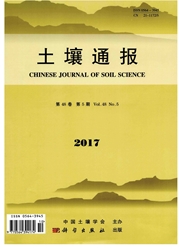

 中文摘要:
中文摘要:
上海青浦练塘镇是著名的茭白之乡,每年会产生大量茭白叶废弃物,对环境构成威胁。茭白叶发酵腐熟后,制成有机肥料,是其资源化再利用的重要途径。为了解茭白叶发酵肥的肥效,布置番茄栽培田间试验,并与菜籽饼肥和复合化肥作比较。研究施用发酵肥对番茄生长、产量和品质、土壤养分和酶活性的影响。结果表明:(1)施用发酵肥土壤有机质含量提高13.8%,土壤有效养分也显著提高,尤以速效钾为最,发酵肥施用也显著促进土壤酶活性,尤其是过氧化氢酶和蔗糖酶活性,番茄生长期,分别提高了93.1%和63.2%。(2)施用发酵肥,能促进番茄生长,提高果实产量达20.4%,但由于其氮磷含量低,肥效缓,对番茄增产效果不及化肥和饼肥。(3)由于发酵肥具有富钾低氮特性,与单施化肥相比,施用发酵肥番茄糖分提高11.4%,硝态氮含量降低28.2%,显著提高果实品质。
 英文摘要:
英文摘要:
Liantang Town, Qingpu District in the western suburb of Shanghai is a well-known water-bamboo town, and produces a huge amount of water-bamboo leaves every year, which poses threat to the environment. Abandoned water-bamboo leaves could be composted and made into organic manure, which is a promising way of recycling. A field experiment of tomato cultivation was carried out to study the fertilizer efficiency of composted water-bamboo leaves manure, compared with that of rapeseed cake manure and synthetic chemical fertilizer. The results were as follows:(1) Application of the composted manure increased organic matter by 13.8% and significantly increased the contents of available nutrients in soil, especially available K. Application of the composted manure also improved soil enzyme activities, especially the activities of catalase and sucrase, which increased by 93.1% and 63.2%, respectively, in the period of tomato growth. (2) Application of the composted manure stimulated the growth of tomato and increased the yield of tomato by 20.4%. However, the yield increase effect of the composted manure was far lower than that of synthetic chemical fertilizer, and also lower than that of cake manure, due to its low content of N and P and slow release of nutrients. (3) Compared with synthetic chemical fertilizer, application of the composted manure increased soluble sugar content in tomato by 11.4% and reduced nitrate nitrogen content by 28.2%, due to its enrichment of K and deficiency of N, thus improving fruit quality more significantly.
 同期刊论文项目
同期刊论文项目
 同项目期刊论文
同项目期刊论文
 期刊信息
期刊信息
